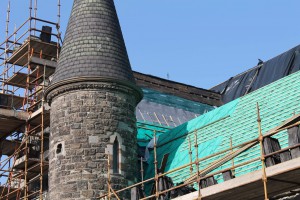 Duncairn Centre for Culture and Arts
Duncairn Centre for Culture and Arts
As part of the conversion and conservation of the former Duncairn Church to a Centre for Culture and Arts, we were commissioned by Doherty Architects to provide an insulation solution.
Liam Brown, MD of Enviroform Solutions explains: “We supplied the Aerogel for the roof on Duncairn Church after being contacted by Doherty Architects. It was the only option in this project to maximise the energy efficiency without compromising the fabric.
“We had to look at providing the highest thermal performance with taking up the least space because of the coping restriction which existed on the roof. In addition consideration had to be given to what we were doing would not affect the structure in anyway i.e. increasing the chances of dry or wet rot by condensation.”
“We did this by carrying out a WUFI assessment which looks at a number of factors like weather, orientation and comes up with a conclusion. It this case it reported that by installing aerogel with certain intelligent vapour barriers then there was no risk.”
“The message is that Aerogel has a real benefit within the Heritage Sector adding real energy performance without risking the fabric of the building.”
The project received a commendation in the Royal Society of Ulster Architects Awards in 2014. It was the cover story in the July/August issue of Perspective Architecture Magazine, the Journal of the Royal Society of Ulster Architects.
The building is listed Grade B+ by the NIEA due to its historic value as part of a unique complex owned by the Presbyterian Church and also due to its architectural merit as a fine example of decorated Gothic style.
The original church and manse, built in 1862, was designed by W J Barre. Subsequent additions, including the side aisles and the organ recess, were designed by Young & McKensie. This project by Doherty Architects, was to convert the disused church to a cultural centre while integrating this with the other facilities of the complex.
Doherty Architects described the main challenges in the project as “Scrabo Stone, dry rot, hammer beam trusses and stained glass provided the conservation challenges and opportunities in the context of many years of decay.
ENDS
